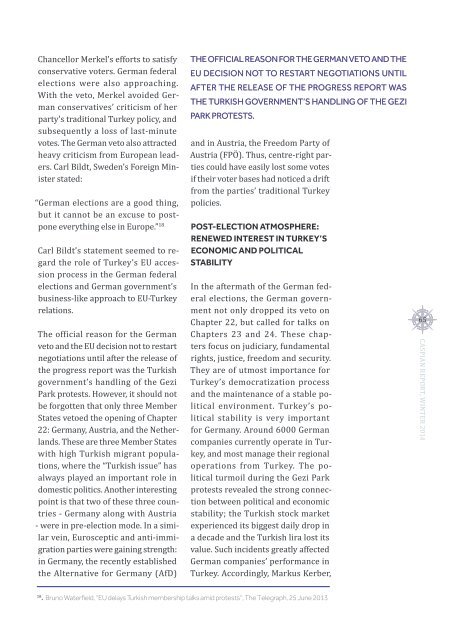Caspian Report - Issue 06 - Winter 2014
Create successful ePaper yourself
Turn your PDF publications into a flip-book with our unique Google optimized e-Paper software.
Chancellor Merkel’s efforts to satisfy<br />
conservative voters. German federal<br />
elections were also approaching.<br />
With the veto, Merkel avoided German<br />
conservatives’ criticism of her<br />
party’s traditional Turkey policy, and<br />
subsequently a loss of last-minute<br />
votes. The German veto also attracted<br />
heavy criticism from European leaders.<br />
Carl Bildt, Sweden’s Foreign Minister<br />
stated:<br />
“German elections are a good thing,<br />
but it cannot be an excuse to postpone<br />
everything else in Europe.” 18<br />
Carl Bildt’s statement seemed to regard<br />
the role of Turkey’s EU accession<br />
process in the German federal<br />
elections and German government’s<br />
business-like approach to EU-Turkey<br />
relations.<br />
The official reason for the German<br />
veto and the EU decision not to restart<br />
negotiations until after the release of<br />
the progress report was the Turkish<br />
government’s handling of the Gezi<br />
Park protests. However, it should not<br />
be forgotten that only three Member<br />
States vetoed the opening of Chapter<br />
22: Germany, Austria, and the Netherlands.<br />
These are three Member States<br />
with high Turkish migrant populations,<br />
where the “Turkish issue” has<br />
always played an important role in<br />
domestic politics. Another interesting<br />
point is that two of these three countries<br />
- Germany along with Austria<br />
- were in pre-election mode. In a similar<br />
vein, Eurosceptic and anti-immigration<br />
parties were gaining strength:<br />
in Germany, the recently established<br />
the Alternative for Germany (AfD)<br />
THE OFFICIAL REASON FOR THE GERMAN VETO AND THE<br />
EU DECISION NOT TO RESTART NEGOTIATIONS UNTIL<br />
AFTER THE RELEASE OF THE PROGRESS REPORT WAS<br />
THE TURKISH GOVERNMENT’S HANDLING OF THE GEZI<br />
PARK PROTESTS.<br />
and in Austria, the Freedom Party of<br />
Austria (FPÖ). Thus, centre-right parties<br />
could have easily lost some votes<br />
if their voter bases had noticed a drift<br />
from the parties’ traditional Turkey<br />
policies.<br />
POST-ELECTION ATMOSPHERE:<br />
RENEWED INTEREST IN TURKEY’S<br />
ECONOMIC AND POLITICAL<br />
STABILITY<br />
In the aftermath of the German federal<br />
elections, the German government<br />
not only dropped its veto on<br />
Chapter 22, but called for talks on<br />
Chapters 23 and 24. These chapters<br />
focus on judiciary, fundamental<br />
rights, justice, freedom and security.<br />
They are of utmost importance for<br />
Turkey’s democratization process<br />
and the maintenance of a stable political<br />
environment. Turkey’s political<br />
stability is very important<br />
for Germany. Around 6000 German<br />
companies currently operate in Turkey,<br />
and most manage their regional<br />
operations from Turkey. The political<br />
turmoil during the Gezi Park<br />
protests revealed the strong connection<br />
between political and economic<br />
stability; the Turkish stock market<br />
experienced its biggest daily drop in<br />
a decade and the Turkish lira lost its<br />
value. Such incidents greatly affected<br />
German companies’ performance in<br />
Turkey. Accordingly, Markus Kerber,<br />
65<br />
CASPIAN REPORT, WINTER <strong>2014</strong><br />
18<br />
. Bruno Waterfield, “EU delays Turkish membership talks amid protests”, The Telegraph, 25 June 2013










